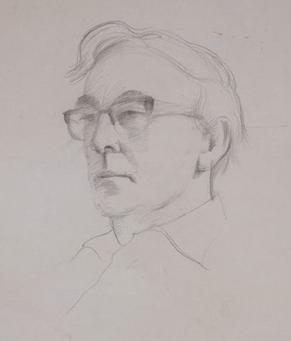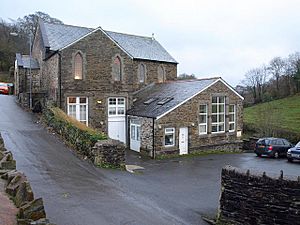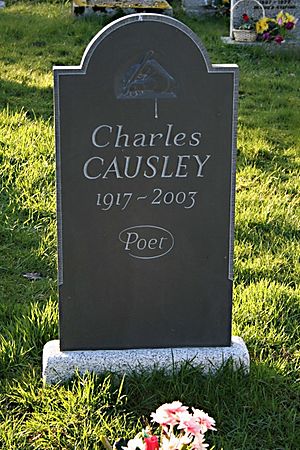Charles Causley facts for kids
Quick facts for kids
Charles Causley
|
|
|---|---|

Pencil drawing of Causley by Stanley Simmonds
|
|
| Born | 24 August 1917 Launceston, Cornwall, England |
| Died | 4 November 2003 (aged 86) Launceston, Cornwall, England |
| Resting place | St Thomas Churchyard, Launceston, Cornwall, England |
| Nationality | British |
| Genre | Poetry (ballads, other formal poetic structures and free verse; also, children's poetry); short plays, including for radio; libretti; short stories; essays and criticism. |
| Notable works | Collected Poems, 1951-1997; Collected Poems for Children; individual poems including 'Timothy Winters', 'Eden Rock' and many more |
Charles Stanley Causley was a famous poet, teacher, and writer from Cornwall, England. He was born on August 24, 1917, and passed away on November 4, 2003. People loved his poems because they were clear and easy to understand. His writing often included ideas from old stories, legends, and magic, especially those connected to his home in Cornwall.
Growing Up in Cornwall

Charles Causley grew up in Launceston, Cornwall. His family had lived and worked in the area for a long time. He went to the local primary school, called a National School, and then to Launceston College.
When Charles was only seven years old, his father passed away in 1924. His father's injuries from the First World War caused his death. This meant Charles was mostly raised by his mother, who was now a widow. Because of this, Charles had to leave school at 15 to help earn money for his family. He worked as an office boy and also played in a dance band that performed for money. Before World War II, he even had one of his plays broadcast on the BBC.
His Life and Work
In 1940, Charles joined the Royal Navy during the Second World War. He worked as a coder, sending and receiving secret messages. He served on a destroyer ship called HMS Eclipse in the Atlantic Ocean. He also worked at naval bases in Gibraltar and northwest England. Later, he was promoted and served on an aircraft carrier called HMS Glory in the Pacific.
Charles later wrote about his experiences during the war in his poems. He also wrote a book of short stories called Hands to Dance and Skylark.
Becoming a Teacher and Poet
After the war ended in 1946, Charles used a government program to train as a teacher. He then returned to his old school in Launceston and taught there full-time for over 35 years. He spent his very last year teaching at St. Catherine's CofE Primary School.
His first collection of poems, Farewell, Aggie Weston, came out in 1951. It included a famous poem called 'Song of the Dying Gunner A.A.1':
Farewell, Aggie Weston, the Barracks at Guz,
Hang my tiddley suit on the door
I'm sewn up neat in a canvas sheet
And I shan't be home no more.
He continued to publish many poems in magazines and books throughout his life.
Traveling and Writing Full-Time
Charles retired early from teaching in 1976 to focus on writing. He traveled a lot, giving poetry readings in the UK and around the world. He also appeared on TV and radio, and for many years, he presented the BBC Radio 4 show Poetry Please.
Even though he was a private person, Charles was friendly and easy to talk to. He corresponded with many famous writers like Ted Hughes, who was his closest friend.
Poems for Children
Charles Causley wrote many popular poems for children. He once said he could live comfortably just from the money he earned when his poem 'Timothy Winters' was used. Here are the first and last verses of that poem:
Timothy Winters comes to school
With eyes as wide as a football pool,
Ears like bombs and teeth like splinters:
A blitz of a boy is Timothy Winters.
—first verse
So come one angel, come on ten:
Timothy Winters says "Amen
Amen amen amen amen."
Timothy Winters, Lord.''
Amen.
Awards and Recognition
Charles Causley received many important awards for his writing. In 1958, he became a Fellow of the Royal Society of Literature. He was made a CBE in 1986. When he was 83, he became a Companion of Literature, which is a very high honor. He also received the Queen's Gold Medal for Poetry in 1967.
Many people wanted him to become the Poet Laureate, which is a special poet chosen by the King or Queen. However, the role went to his friend Ted Hughes, and Charles wasn't very keen on the idea himself. Still, the people of his hometown called him "the greatest poet laureate we never had."
In 1979, he was interviewed on the famous radio show Desert Island Discs. In 1982, a book of poems was published in his honor, with contributions from famous poets like Ted Hughes and Philip Larkin. This showed how much the poetry community respected him.
'Eden Rock'
One of his later poems, 'Eden Rock', has become very well-known. It's a touching poem about childhood, memories, family, and life. Its first lines are:
They are waiting for me somewhere beyond Eden Rock:
My father, twenty-five, in the same suit
Of Genuine Irish Tweed, his terrier Jack
Still two years old and trembling at his feet.
You can listen to Charles Causley himself reading 'Eden Rock' and other poems on the Poetry Archive website.
His Legacy
The Charles Causley Trust is a charity that celebrates his life and work. They also encourage new writing in the area where he lived. In 2006, the Trust bought Cyprus Well, Charles's small house in Launceston. After repairs, it's now open to the public on a limited basis. It also hosts writers, artists, and musicians who come to stay and work there.
Charles Causley Festival
Since 2010, an annual Charles Causley Festival has taken place in Launceston. This festival celebrates literature, music, and art. It features performers and artists from the local area, the UK, and even around the world. Famous poets like Sir Andrew Motion and Carol Ann Duffy have been part of the festival. Musicians like Jim Causley, a distant relative of Charles, have also performed. Jim Causley has even set some of Charles's poems to music.
In 2020, because of the worldwide coronavirus pandemic, the festival became completely digital. People could watch talks and performances online for free. This allowed a much larger audience from all over the world to enjoy the festival.
Poetry Competitions
The Charles Causley Trust also runs the Charles Causley International Poetry Prize for adults. This competition started in 2013 and has grown to include entries from many countries. There are cash prizes and good publicity for the winners.
The Trust also organizes a Young Person's Poetry Competition for younger writers. Famous judges like Jackie Kay and Patrick Gale have helped choose the winners.
Main Publications
Here are some of Charles Causley's main books:
Books for Adult Readers
- Hands to Dance (short stories, 1951)
- Farewell, Aggie Weston (1951)
- Survivor's Leave (1953)
- Union Street (1957)
- Johnny Alleluia (1961)
- Underneath the Water (1968)
- Secret Destinations (1984)
- Collected Poems: several editions, including Collected Poems 1951-2000 (2000)
Books for Young Readers
- Figure of 8 (narrative poems, 1969)
- Figgie Hobbin: Poems for Children (1970)
- 'Quack!' Said the Billy-Goat (c.1970)
- The Tail of the Trinosaur (1972)
- As I Went Down Zig Zag (1974)
- When Dad Felt Bad (1975)
- The Animals' Carol (1978)
- Early in the Morning: A Collection of New Poems (1986)
- Jack the Treacle Eater (1987) – this book won an award for its writing and illustrations.
- Collected Poems for Children (1996, reprinted 2017)
Plays and Libretti
- Runaway (1936)
- The Conquering Hero (1937)
- Benedict (1938)
- How Pleasant to Know Mrs. Lear: A Victorian Comedy in One Act (1948)
- The Ballad of Aucassin and Nicolette (libretto, 1981)
As Editor
- Peninsula (1957)
- Dawn and Dusk (1964)
- Modern Folk Ballads (1966)
- The Puffin Book of Magic Verse (1974)
- The Puffin Book of Salt-Sea Verse (1978)
- The Sun, Dancing: An Anthology of Christian Verse (1984)
As Translator
- Twenty-Five Poems by Hamdija Demirovic (1980)
- Schondilie (1982)
- Kings' Children (1986)


